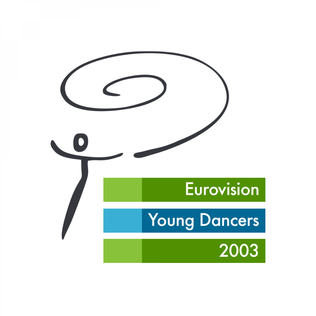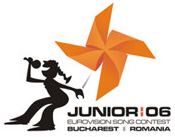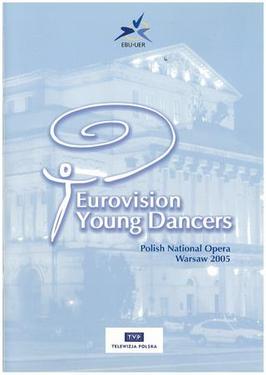
The Eurovision Young Dancers 1995 was the sixth edition of the Eurovision Young Dancers, held at the Palais de Beaulieu in Lausanne, Switzerland on 6 June 1995. Organised by the European Broadcasting Union (EBU) and host broadcaster Swiss Broadcasting Corporation, dancers from nine countries participated in the televised final. A total of fifteen countries took part in the competition. Hungary and Russia made their début while Denmark and Estonia decided not to participate. However, the Danish broadcaster DR broadcast the event as did Bulgaria and Romania.

The Eurovision Young Dancers 1997 was the seventh edition of the Eurovision Young Dancers, held at the Teatr Muzyczny in Gdynia, Poland on 17 June 1997. Organised by the European Broadcasting Union (EBU) and host broadcaster Telewizja Polska (TVP), dancers from seven countries participated in the televised final. A total of thirteen countries took part in the competition. Latvia and Slovakia made their début while five countries decided not to participate. However, France, Switzerland, Norway and, for the first time Ireland, broadcast the event.

The Eurovision Young Dancers 2003 was the tenth edition of the Eurovision Young Dancers, held at the Stadsschouwburg Theatre in Amsterdam, Netherlands between 29 June and 4 July 2003. Organised by the European Broadcasting Union (EBU) and host broadcaster Nederlandse Programma Stichting (NPS), dancers from ten countries participated in the televised final. A total of seventeen countries took part in the competition therefore a semi-final was held a few days before at the same venue. Armenia and Romania made their début while Austria, Germany and Ireland decided not to participate.

The Junior Eurovision Song Contest 2006 was the fourth edition of the annual Junior Eurovision Song Contest for young singers aged 8 to 15. On 2 December 2006, the contest was broadcast live from Bucharest, Romania making it the second time the contest had been held in a capital city. It was organised by the Romanian national broadcaster, Romanian Television (TVR), in co-operation with the European Broadcasting Union (EBU).

The Eurovision Young Dancers 2005 was the eleventh edition of the Eurovision Young Dancers, held at the National Theatre in Warsaw, Poland on 24 June 2005. Organised by the European Broadcasting Union (EBU) and host broadcaster Telewizja Polska (TVP), dancers from ten countries participated in the televised final. A total of thirteen countries took part in the competition. For this contest, a week of dance master classes replaced the semi-final round in order to select the finalists. Armenia, Estonia, Switzerland and Ukraine decided not to participate.

"Tornerò" is a song by Romanian singer Mihai Trăistariu from his eighth studio album of the same name (2006). Released by CMC Entertainment on 3 July 2006, it was written by Cristian Hriscu, Mihaela Deac and its producer Eduard Cîrcotă. With English verses and a refrain in Italian, "Tornerò" is a disco, pop, dance and rave song featuring Trăistariu using his higher vocal range. The track won the Selecția Națională pre-selection show and represented Romania in the Eurovision Song Contest 2006, held in Athens, Greece. There, the singer was pre-qualified for the Grand Final, where he finished fourth with 172 points. On stage, three male and two female dancers from Romanian dance group Big Bounce accompanied Trăistariu, performing a mixture of ballet and contemporary dance.

"The Balkan Girls" is a song by Romanian singer Elena Gheorghe for a special 2009 edition of her second studio album, Te Ador (2008), and third record, Disco Romancing (2012). It was written by Laurențiu Duță and Alexandru Pelin, while production was handled by Duță, Ovidiu Bistriceanu and Daris Mangal. The song was released on an enhanced CD on 6 January 2009 by Cat Music. "The Balkan Girls" is a folk-influenced dance-pop song whose refrain celebrates the party life of Balkan girls.

Hotel FM is a Romanian band, formed in April 2005 by British expatriate David Bryan and his friends Gabriel Băruţa and Alex Szűz. The band held concerts in several cities in Romania and Germany and launched a promotional CD in spring 2006.

"Miracle" is a song recorded by Romanian singer Paula Seling and Romanian-Norwegian performer Ovidiu Cernăuțeanu for the latter's 2014 studio album A Bit of Pop Won't Hurt Anyone. It was written by Beyond51, Frida Amundsen, Ovi and Philip Halloun, while production was solely handled by Beyond51. The track was made available for digital download on 28 February 2014 in various countries, along with CDs released in Romania and Norway by the Romanian Television (TVR) and DaWorks, respectively. "Miracle" has been described as a love-themed dance and eurodance song, featuring techno beats and a piano in its instrumentation. Reviewers compared the recording to the music of multiple producers, including Benny Benassi and Avicii.

Romania has participated in the biennial classical music competition Eurovision Young Musicians 5 times since its debut in 2002, most recently taking part in 2010 and are yet to receive a top 3 placing in any contest.

Malta has participated in the Eurovision Young Dancers 2 times since its debut in 2015. On 7 July 2015, PBS Malta, which is responsible for Malta's participation confirmed that Malta will host the 2017 edition. However, in January 2017, the EBU announced that PBS had due to circumstances beyond their control been forced to cancel their staging of the competition. Nevertheless, they will still take part in the contest.

The Czech Republic has participated in the Eurovision Young Dancers 7 times since its debut in 1999. The Czech Republic has hosted the contest twice, in 2015 and in 2017.

Yugoslavia has participated in the Eurovision Young Dancers 3 times.

France has participated in the Eurovision Young Dancers 7 times since its debut in 1985. France has hosted the contest twice, in 1989 and 1999.

Poland has participated in the Eurovision Young Dancers 11 times since its debut in 1993. Poland has hosted the contest a record three times, in 1997, 2005 and 2013, and has won the contest three times. On 5 September 2016, Polish broadcaster Telewizja Polska (TVP) confirmed they would participate again in 2017.

The United Kingdom has participated in the Eurovision Young Dancers 7 times since its debut in 1985, most recently taking part in 2005. The UK has hosted the contest once, in 2001 and jointly won the contest in 1989.

Switzerland has participated in the Eurovision Young Dancers 9 times since its debut in 1985. Switzerland has hosted the contest once, in 1995.

Estonia has participated in the Eurovision Young Dancers 4 times since its debut in 1993.

Austria has participated in the Eurovision Young Dancers 5 times since its debut in 1987, most recently taking part in 2001.

"Amnesia" is a song recorded by Romanian singer Roxen, digitally released by Warner Music Poland on 4 March 2021. It was written by Adelina Stîngă and Victor Bouroșu, while the production was solely handled by the latter. A dark ballad, the song's lyrics discuss combatting self-neglection in modern society, referring to this phenomenon as "self-love amnesia". Music critics generally applauded the song, with praise concentrated on its catchiness and commercial appeal, as well as on Roxen's vocal delivery. For promotional purposes, a music video was released simultaneously with the digital premiere of the song and was directed by Bogdan Păun. Filmed at an empty National Theatre Bucharest, the visual shows Roxen and several dancers performing contemporary dance to portray the story of a person who manages to gain control over their surrounding fears.


















